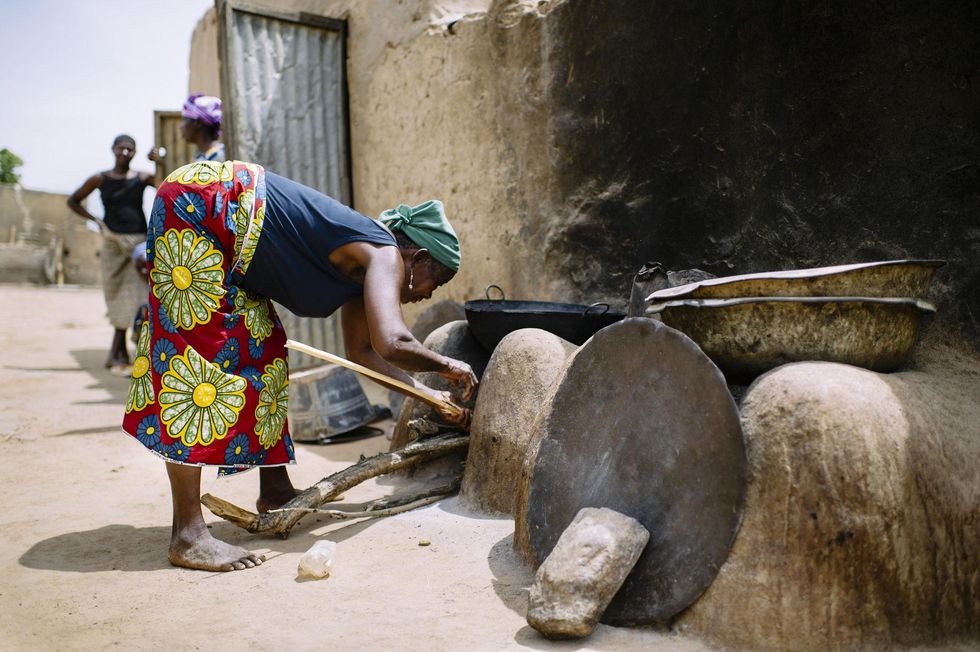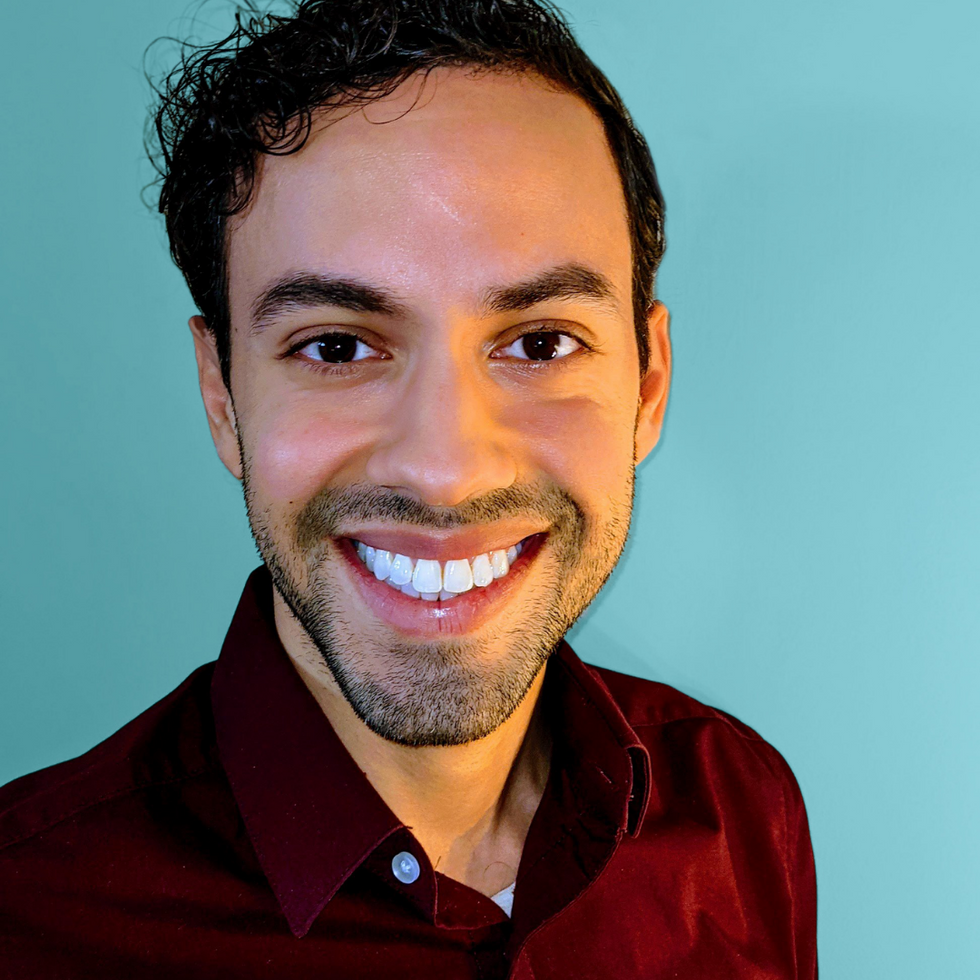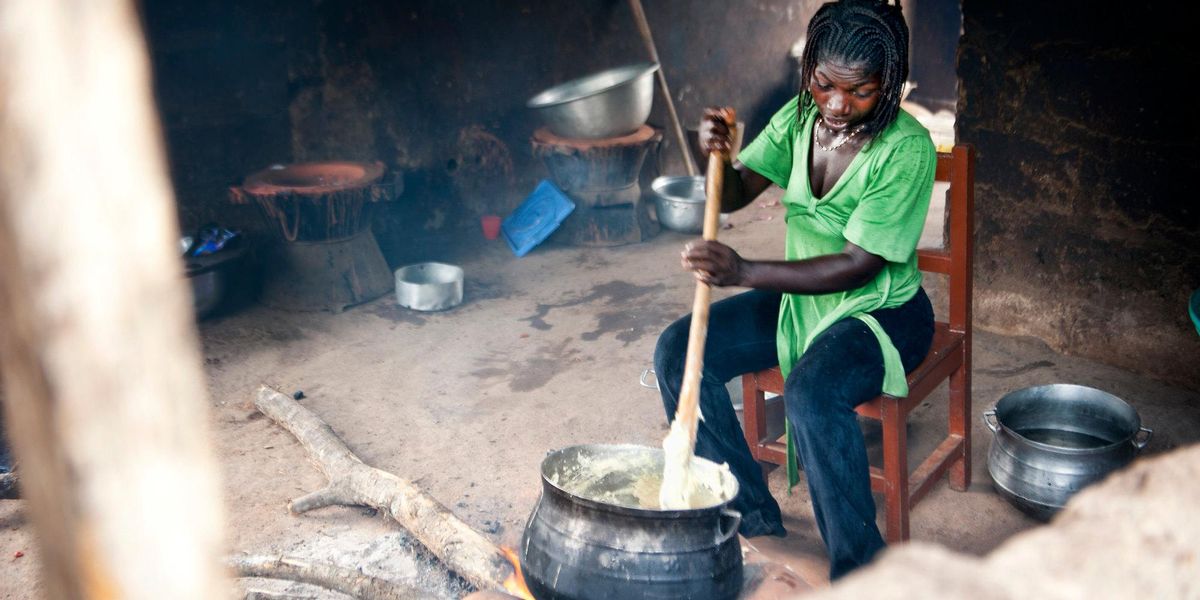What do new cookstoves in Ghana and air conditioners in NYC have in common? Energy justice.
Combating energy poverty and energy insecurity are critical elements to achieving environmental health equity for billions worldwide.
In 2014, I started my doctorate with the intention of studying the health effects of high temperatures and different populations’ vulnerability to those effects.
But the faculty member I was going to collaborate with left my institution. It ended up being a blessing in disguise, because another faculty member offered to work with me on research that was unfamiliar to me: household air pollution in Ghana, West Africa. I cautiously agreed—and it made me the researcher I am today.
Energy access and inequality are important, contentious, and understudied issues in public health. Access to household energy is fundamental to human health: our homes need energy for everything from cooking to keeping ourselves warm during the winter and cool during the summer. But not everyone has access to health-sustaining fuel sources, creating a crisis of “energy poverty,” where lack of access to modern energy sources is driving three billion people worldwide to wood, dung, charcoal, or other solid fuels for cooking and heating.
Energy poverty is often seen in low- and middle-income countries, but energy inequalities exist in high income countries as well. Increasingly hot summers are forcing millions in the U.S.—largely low-income and people of color—to make difficult decisions about staying cool or putting food on the table. Whether in Ghana or the Bronx, the resources exist to protect communities from health harms, but those most impacted by these household energy inequities continue to be the poor and marginalized.
Climate and energy poverty
When people burn solid fuels, they are exposed to a toxic combination of particles and gases that are associated with 1.6 million premature deaths annually. The solution? Expanded access to clean-burning fuels like liquified petroleum gas (LPG).
If you read that last sentence and thought, “hold up, did a climate and health researcher just say we should increase fossil fuel use?” then I invite you to read on and also learn how this issue relates to justice.
Energy poor households exist around the world, but are concentrated in low- and middle-income countries in Sub-Saharan Africa, Asia, and South America. Many of these countries have poor national economies, but also have stark gaps between the rich and poor.
Some countries are addressing solid fuel use. India created subsidies for poor families to increase access to cleaner cooking fuels; Ghana and Cameroon are changing liquid petroleum gas infrastructure and regulations to improve accessibility and safety, such as changing who owns the gas cylinders. For example, in Ghana, cylinders have been owned by the consumer, but now those cylinders will be owned by the company; and instead of refilling your cylinder you would swap it out for a new one, which means that distributors are tasked with maintaining and repairing the cylinders for safety.
This essay is part of "Agents of Change" — see the full series
Generally speaking, people I have interacted with in Ghana like using LPG stoves, although cost is consistently an issue since the government no longer subsidizes it. In a study I co-authored, participants discussed their impressions of using a liquid petroleum gas stove.
One participant explained, “It is really helpful. I really get time. I can put food on fire and if I want to wash too, I can do that as well. If it was the muchia, [traditional stove] I won’t get the time to do all that. If you put the food on, you have to be pushing the firewood into the fire and fan it. There is also smoke. With all this, can you do anything else whilst cooking? No, you can’t”.
Evidence shows that transitioning away from solid fuels to liquid petroleum gas will actually mitigate future global warming. The science is complicated, but it comes down to two major pieces: 1) solid fuel use leads to deforestation in many countries because trees that would otherwise capture carbon are being used for fuel, and 2) carbon dioxide is not the only greenhouse compound we need to worry about. For example, solid fuel combustion produces considerable aerosols (particulate matter air pollution), which can absorb more solar energy in the lower atmosphere and contribute to warming.
But there is uncertainty, both in the science (how great the effect would be), and how these policies will be enacted. So is it still worth it to transition away from solid fuels even if the alternatives are fossil fuels? The short answer: yes. Humans throughout the world are experiencing poor health outcomes from solid fuel use.
Saving lives through reduced solid fuel use

Woman lights her stove to prepare lunch, in the village of Zorro, Burkina Faso. (Credit: Ollivier Girard/CIFOR)
The global poor are not responsible for climate change; the poorest 50% of people on our planet have collectively contributed just 7% of cumulative global greenhouse gas emissions since 1990. Reduced solid fuel use is therefore not going to cause a huge greenhouse gas reduction—but it could save lives.
Burning solid fuels exposes people to harmful particles—reducing that combustion would prevent lower respiratory infections in 440,000 babies, and a slew of other diseases such as lung cancer, stroke, and heart disease in hundreds of thousands of adults annually. These health impacts and deaths are preventable, and society has the resources to make these transitions to cleaner alternatives.
This essay is also available in Spanish
But those resources are unevenly spread. Globally, income inequality is decreasing, but that is not the case within many countries, specifically in Ghana, according to Oxfam and a report from the United Nations Development Programme. The Ghanaian economy is the second largest in West Africa and, despite economic growth, income inequality has widened. Oxfam writes “...one of the richest men in Ghana earns more in a month than one of the poorest women could earn in 1,000 years.”
So while absolute poverty may be decreasing, this does not solve the income and access issues that low-income families face when they want cleaner cooking alternatives. The distance most people have to travel to refuel their liquified petroleum gas, and the high cost of that gas (relative to their income) are major barriers to sustained use of a clean fuel.
These barriers to accessing affordable energy are not unique to Ghana—the problems may look different, but energy injustice persists right here in the U.S. as well.
Climate and energy insecurity
It was already in the high 80s (°F) on one late spring day in New York City some years ago. I had eaten dinner with friends and we were standing outside chatting. Younger adults across the street started an argument that ended up a brawl that spilled into the street. I remember an older Latina on a stoop near me said “llegó el verano” (summer has arrived). Oftentimes research catches up to intuitive cultural knowledge.
There is now substantial research that shows exposure to high temperatures is related to a host of diseases, premature death, as well as elevated levels of violence and poorer educational performance in kids.
Research shows that poor people and Black, Indigenous, and people of color (BIPOC) experience hotter summers in the U.S. This may be partly due to BIPOC communities’ overrepresentation in the southernmost states that have warmer climates. However, there is research showing that BIPOC communities are hotter even within compact geographies. This is probably because BIPOC communities have higher amounts of impervious surfaces (asphalt and concrete) and less greenspace than neighboring white communities.
In other work, collaborators and I show that Black people are more likely to spend a large proportion of their income on electricity and heating costs compared to white communities. This is a recipe for energy insecurity: a combination of energy demand, personal financial constraints, and behavior in response to those constraints. You may have heard of the “heat or eat” dilemma, which people have used to describe how, during the winter, people make trade-offs between food and warmth. But with climate change, we need to be talking about an analogous dilemma: “heat stroke or go broke.” Are people forgoing other necessities, like cooling, during the summer when they may really need it? This, too, is energy injustice.
Many countries are working to prevent adverse health outcomes in relation to poverty, and energy poverty specifically. In the U.S., there are states that are also prioritizing health with regard to seasonal energy protections. A total of 44 states have cold-weather protections, meaning utility shut-offs are regulated to protect vulnerable populations during the winter. Substantially fewer states have summertime protections, which is an increasingly important stop gap with climate change. The resources exist to protect, and support, people even when their personal finances prevent use of health-sustaining technologies.
As a child, my own unexpected health issues led my parents to financial turmoil. They could not keep up with the medical bills, and the collectors started calling. Many people experience these types of financial issues that often cascade into other areas of their finances, like utilities. We were fortunate to not have experienced a utility shut-off, but I often think about the countless people who have had such experiences during extreme cold or hot weather.
Utility protections exist at a state level, but they highlight the fact that the effectiveness of summertime cooling is not only based on owning an air conditioner, but being energy secure enough to run it. In the face of these challenges, environmental justice advocates say we need to expand access to air conditioners and subsidize summertime electricity use with the Low Income Home Energy Assistance Program, which has historically been used to fund wintertime heating needs. To me, this is a commonsense solution.
Household energy is fundamental to human health

Heat wave in Brooklyn, June 2021. (Credit: Marco/flickr)
As a researcher, I have now come full circle. After completing my PhD, I returned to temperature epidemiology and heat disparities as my main research focus. But now I have an appreciation of how energy inequality, while manifesting very differently, is a concern worldwide.
Household energy is fundamental to human health in Ghana, the U.S., and every other part of the planet; and an equitable society is one that does not allow people to get sick or die due to an inability to pay for basic household energy needs. However, structural poverty and racism create larger hurdles for poor and marginalized communities to access, afford, and sustain healthful energy use in Ghana and the U.S., despite radically different economies.
Researchers and policymakers interested in global environmental health equity must seriously consider the importance of energy justice in protecting poor and marginalized populations. This involves identifying the populations most impacted by energy injustice, identifying and studying potential interventions, vetting those interventions by those impacted, and putting that research into the hands of those who can take action.
Combating energy poverty and energy insecurity are critical elements to achieving environmental health equity for billions worldwide.

Dr. Daniel Carrión is an assistant professor of Environmental Health Sciences at the Yale School of Public Health. He studies climate, energy, and health inequities globally and domestically, with a focus on children’s health. Follow him on Twitter at @dcarrionenviro.
This essay was produced through the Agents of Change in Environmental Justice fellowship. Agents of Change empowers emerging leaders from historically excluded backgrounds in science and academia to reimagine solutions for a just and healthy planet.
Banner photo: Indoor cooking in Ghana. (Credit: Ben Grey/flickr)







